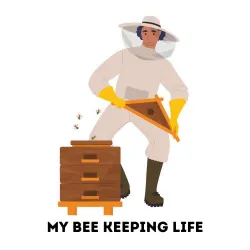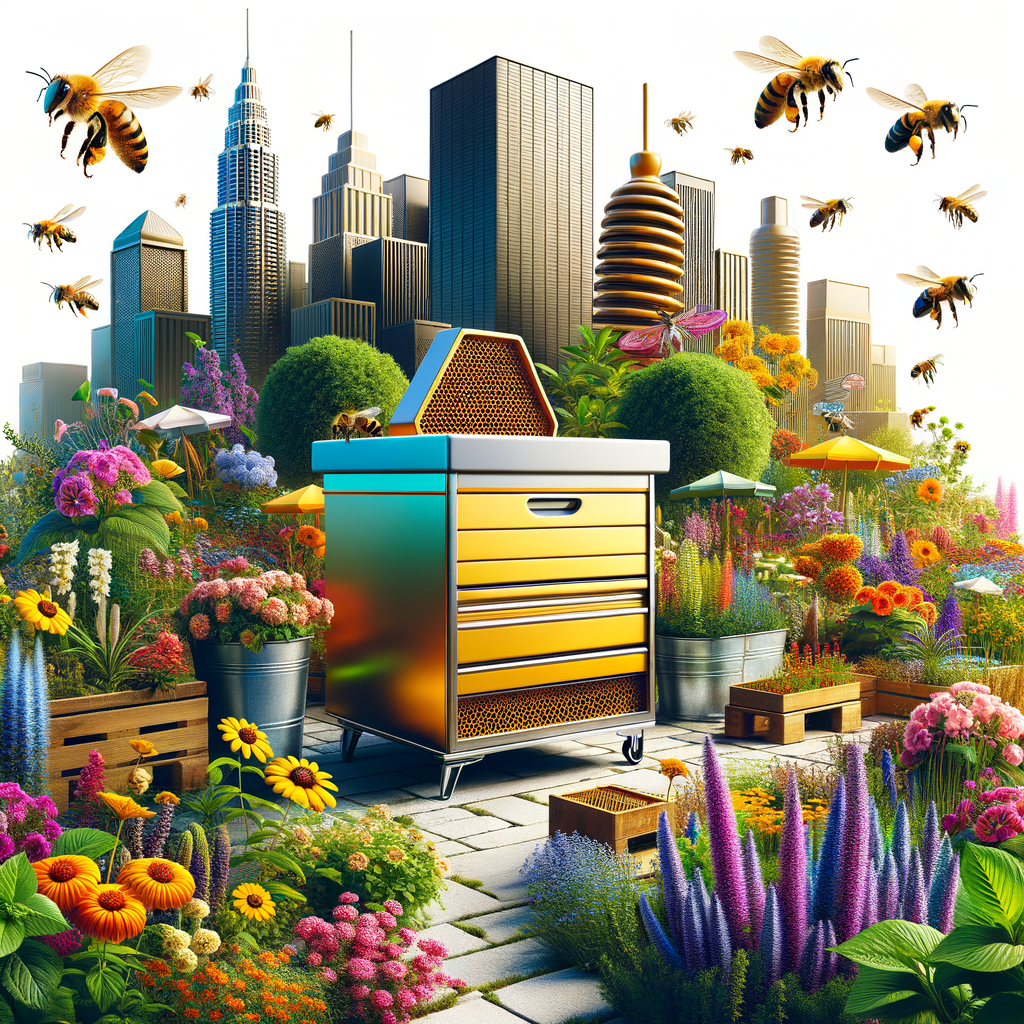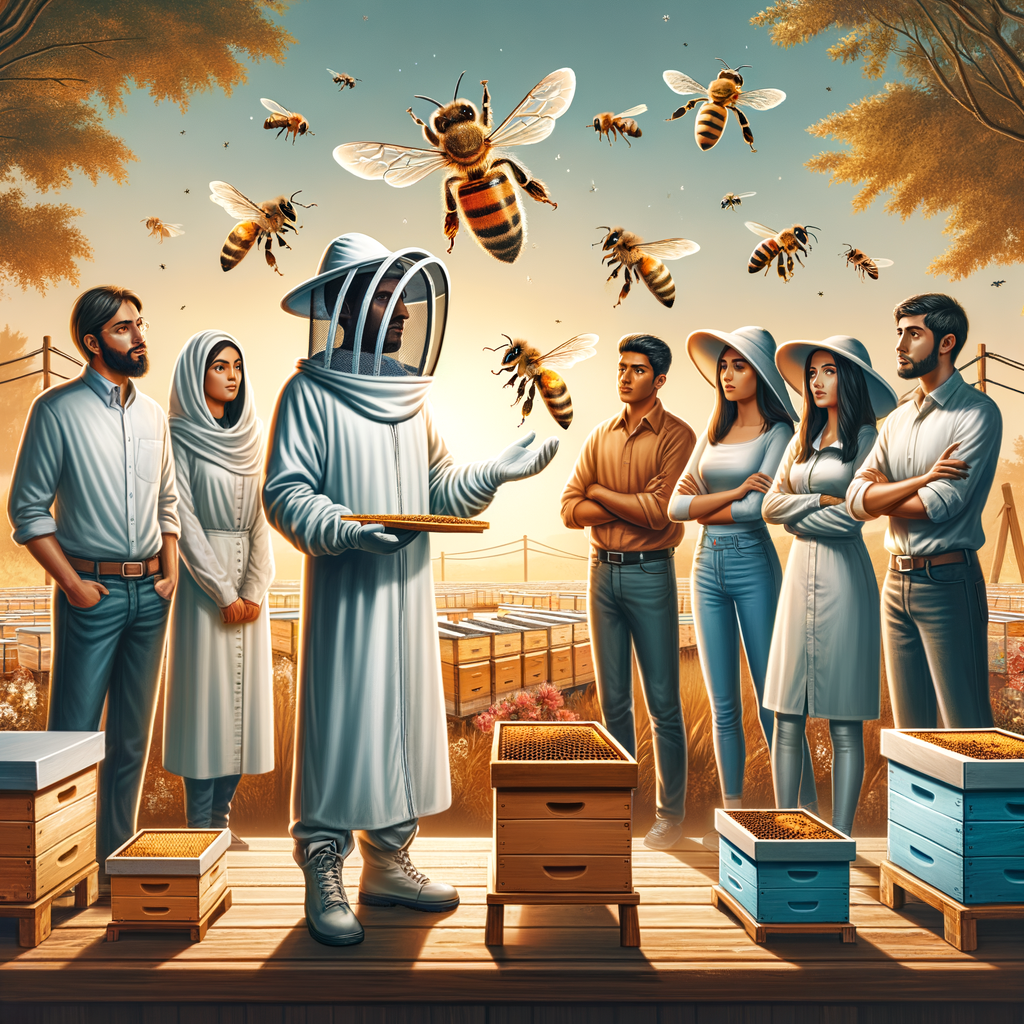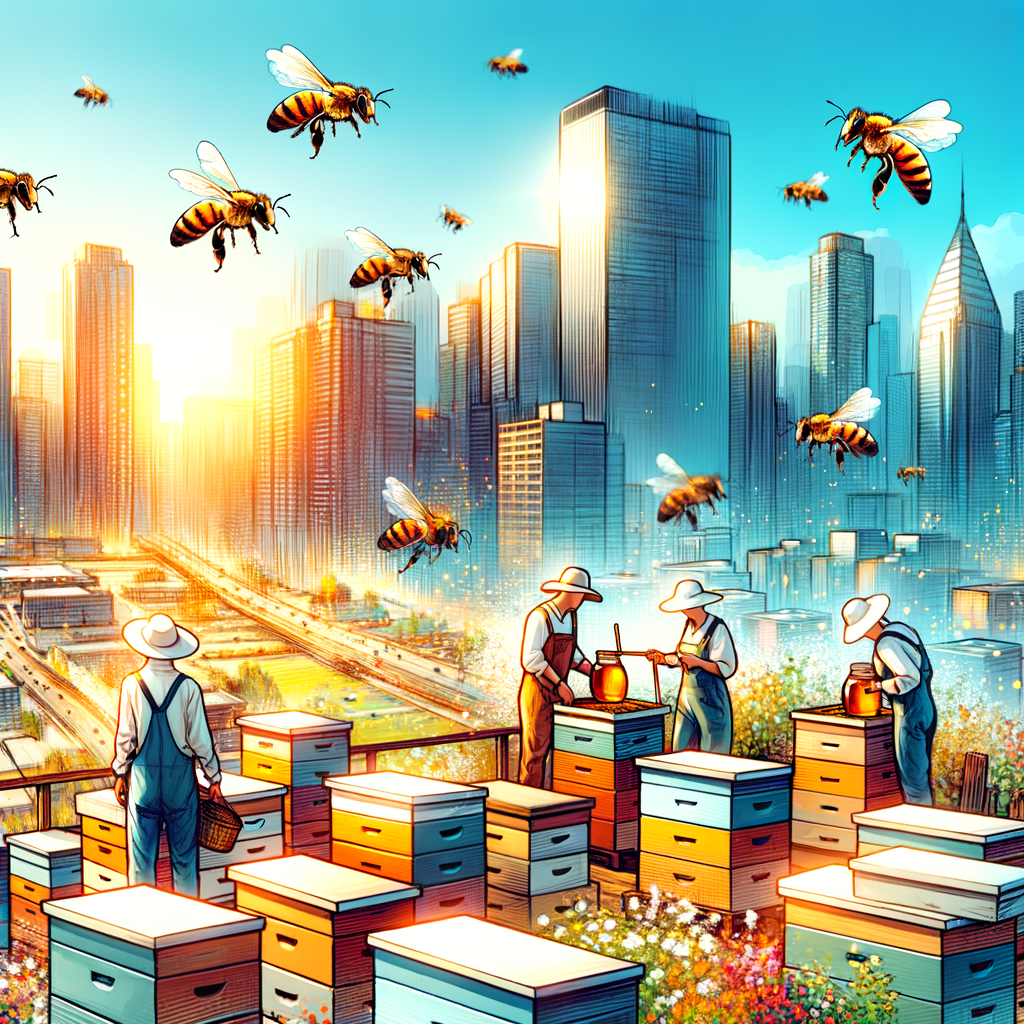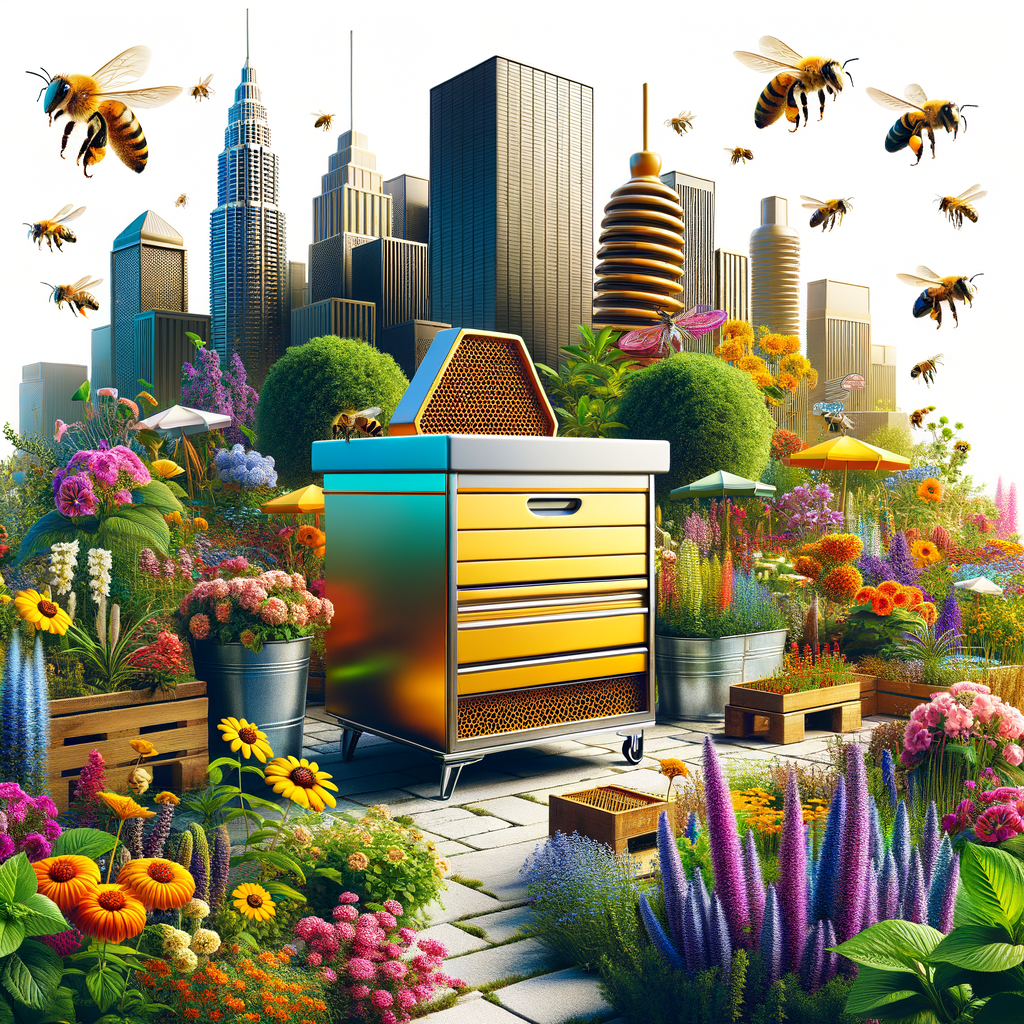
Introduction to Urban Gardening and Bee Pollination
Welcome to the fascinating world of urban gardening and bee pollination. This article aims to enlighten you about the importance of these two interconnected topics and how they can transform our urban spaces into green, sustainable environments. Let’s dive in!
-
- Understanding Urban Gardening
Urban gardening, sometimes known as urban farming, is the practice of cultivating, processing, and distributing food in or around urban areas. It involves growing plants in small spaces such as balconies, rooftops, and patios. Urban gardening is not just about beautifying our cities; it also plays a crucial role in promoting food security, improving air quality, and enhancing our overall well-being.
Did you know that in 2018, 35% of households in the United States were involved in food gardening? And a significant portion of this was urban gardening. This shows how urban gardening is gaining popularity and becoming a vital part of our urban lifestyle.
-
- The Importance of Bee Pollination in Urban Gardens
Now, let’s talk about our little friends, the bees. Bees are the champions of pollination. They help plants to reproduce by transferring pollen from the male parts of a flower to the female parts. This process is crucial for the growth of fruits and vegetables.
In urban gardens, bees play a vital role in increasing crop yield. Without bees, our urban gardens would be less productive and colorful. According to a study, bees are responsible for pollinating approximately 70 of the 100 crop species that feed 90% of the world. This highlights the importance of bees in our food system.
So, by encouraging bee pollination in our urban gardens, we are not only enhancing our local food production but also contributing to global food security. Isn’t that amazing?
In the following sections, we will delve deeper into the power of bee pollination, how to enhance gardens with bee pollination, and the future of urban gardens and bee pollination. Stay tuned!
The Power of Bee Pollination
Bees are more than just tiny creatures buzzing around our gardens. They are powerful agents of pollination, playing a crucial role in the growth and development of plants. Let’s take a closer look at bee pollination and its importance in our ecosystem.
Understanding Bee Pollination
Bee pollination is a fascinating process that involves the transfer of pollen from the male parts of a flower to the female parts. This process is crucial for the fertilization and growth of many plants. Let’s delve deeper into how this process works and why bees are so important in our ecosystem.
-
- How Bee Pollination Works
Bees are attracted to flowers due to their bright colors and sweet nectar. As bees move from flower to flower, they collect pollen on their bodies. This pollen is then transferred to other flowers, leading to fertilization. This process is known as pollination. It’s like a delivery service, with bees acting as the delivery agents!
-
- Importance of Bees in the Ecosystem
Bees are vital for the survival of our ecosystem. They help in the growth of fruits, vegetables, and flowers by pollinating them. Did you know that about one-third of the food we eat is a direct result of bee pollination? Without bees, our food supply would be significantly reduced. Bees also help in maintaining biodiversity by assisting in the pollination of various plants, which in turn provide habitat and food for other wildlife.
They are powerful pollinators that play a crucial role in our ecosystem. So, the next time you see a bee, remember the important work it’s doing!
Bee Pollination Benefits
Bees are more than just honey producers. They play a crucial role in pollination, which brings about a host of benefits. Let’s look at two significant advantages of bee pollination: enhancing garden productivity and boosting biodiversity in urban areas.
- Enhancing Garden Productivity
Bees are nature’s little helpers. They transfer pollen from the male parts of a flower to the female parts, allowing plants to grow fruits and seeds. This process is known as pollination. Without bees, our gardens would be less colorful and less productive.
Did you know that bees are responsible for pollinating about one-third of the food we eat? That includes fruits, vegetables, and nuts. A study showed that in areas where bees visited flowers, the plants produced 50% more seeds than areas without bees. So, if you want your garden to be more productive, attracting bees is a good strategy.
- Boosting Biodiversity in Urban Areas
Bees don’t just help gardens grow. They also contribute to biodiversity, particularly in urban areas. Biodiversity refers to the variety of life in a particular habitat or ecosystem. More biodiversity means a healthier and more balanced ecosystem.
Urban areas often lack biodiversity. But bees can help change that. When bees pollinate plants, they help create new plant life. This new plant life can attract other wildlife, like birds and butterflies. As a result, urban areas become more diverse and vibrant.
In a study in Chicago, researchers found that gardens with more bees had a greater variety of plants and wildlife. This shows that bees can help boost biodiversity in urban areas. So, the next time you see a bee buzzing around, remember that it’s doing important work for our environment.
Enhancing Gardens with Bee Pollination
Bees play a crucial role in enhancing the beauty and productivity of our gardens. By understanding how to attract these industrious pollinators, we can create a thriving, bee-friendly garden.
Creating a Bee-Friendly Garden
Creating a bee-friendly garden involves two main steps: choosing bee-friendly plants and providing water and shelter for bees. Let’s explore these steps in detail.
-
- Choosing Bee-Friendly Plants
Bees are attracted to a variety of plants, but they especially love those that produce plenty of nectar and pollen. Some bee-friendly plants include sunflowers, lavender, and rosemary. Planting a variety of these in your garden will not only attract bees but also add color and fragrance.
-
- Providing Water and Shelter for Bees
Bees need water to survive, just like us. You can provide water for bees by creating a bee bath. Fill a shallow dish with water and place pebbles or marbles in it for the bees to land on. Bees also need shelter, especially during harsh weather. You can provide shelter by leaving some areas of your garden undisturbed or by installing a bee house.
By following these steps, you can create a garden that not only looks beautiful but also supports the vital work of bees. Remember, every flower that a bee visits helps to pollinate our world, making it a more vibrant and fruitful place.
Urban Beekeeping: A Step Further
After creating a bee-friendly garden, you might be considering taking a step further into urban beekeeping. This practice involves keeping bees in an urban environment and can be a rewarding way to enhance your garden and contribute to the environment.
-
- Basics of Urban Beekeeping
Urban beekeeping is not as complicated as it might seem. It starts with understanding the needs of the bees and providing them with a suitable habitat. This includes a hive for them to live in and a variety of plants for them to feed on. Bees also need a clean water source and protection from predators and harsh weather conditions.
It’s also important to understand the behavior of bees. They are social insects that live in colonies, and each bee has a specific role to play. The queen bee is responsible for laying eggs, while worker bees collect pollen and nectar to feed the colony. Drone bees are responsible for mating with the queen.
Finally, urban beekeeping requires regular maintenance of the hive. This includes checking the health of the bees, ensuring they have enough food, and harvesting the honey.
-
- Benefits and Challenges of Urban Beekeeping
Urban beekeeping has many benefits. It can increase the pollination of plants in your garden, leading to a more vibrant and productive garden. It also produces honey, which you can use for yourself or sell for a profit. Additionally, urban beekeeping can help to increase the population of bees, which are essential for pollination and are currently in decline.
However, urban beekeeping also comes with its challenges. Bees can sting, which can be a concern if you have children or pets. They can also be a nuisance to neighbors if they swarm or if their hive is too close to property boundaries. Additionally, urban beekeeping requires time and commitment, as the bees and their hive need to be regularly checked and maintained.
However, it requires understanding the needs of the bees, providing them with a suitable habitat, and regularly maintaining the hive. It also comes with challenges, such as potential stings and the time commitment required.
Sustainable Urban Gardening and Bee Pollination
Urban gardening is not just about growing plants in the city. It’s about creating a sustainable environment where nature and humans coexist harmoniously. A key player in this balance is the humble bee, whose role in pollination is crucial for the success of urban gardens. Let’s explore how bee pollination contributes to sustainable urban gardening.
Role of Bee Pollination in Sustainable Urban Gardening
Bee pollination plays a vital role in urban gardening. It contributes significantly to urban agriculture and supports the ecosystem of urban gardens. Here’s how:
-
- Contribution to Urban Agriculture
Bees are nature’s most efficient pollinators. They help in the reproduction of plants by transferring pollen from the male parts of a flower to the female parts. This process is essential for the production of fruits and seeds. In urban gardens, bees pollinate a variety of plants, including fruits, vegetables, and flowers. This increases the yield and diversity of crops, contributing to the sustainability and productivity of urban agriculture.
-
- Supporting Urban Garden Ecosystems
Beyond pollination, bees play a crucial role in supporting the ecosystem of urban gardens. They help maintain biodiversity by pollinating a wide range of plants, which in turn provide food and habitat for other wildlife. Moreover, bees’ pollination efforts contribute to the health and vitality of plants, making urban gardens more resilient to pests and diseases. Thus, bees are not just beneficial for plants, but for the entire urban garden ecosystem.
It not only enhances the productivity of urban agriculture but also supports the biodiversity and resilience of urban garden ecosystems. As we continue to develop our cities, let’s not forget the important role that bees play in our urban gardens.
Case Studies: Successful Urban Gardens with Bee Pollination
Let’s take a closer look at two case studies that highlight the power of bee pollination in urban gardens. These examples will show you how bees can make a big difference in the success of your garden.
-
- Case Study 1: The Rooftop Garden in New York City
In the heart of New York City, a rooftop garden thrives, thanks to the help of bees. This garden, located on top of a high-rise building, was struggling to produce a variety of fruits and vegetables. The gardeners decided to introduce a hive of honey bees to the garden. The results were astounding.
Within a year, the garden’s yield increased by 40%. The variety of plants also grew, with more types of fruits and vegetables flourishing. This case study shows how bees can boost the productivity and diversity of an urban garden.
-
- Case Study 2: The Community Garden in San Francisco
San Francisco’s community garden had a similar success story. The garden was doing well, but the gardeners wanted to increase the variety of plants. They introduced several bee hives to the garden, and the results were impressive.
The garden saw a 35% increase in yield and a significant increase in the variety of plants. The bees also helped to create a more balanced ecosystem within the garden. This case study demonstrates how bees can support a healthy and diverse garden ecosystem.
These case studies highlight the power of bee pollination in urban gardens. By introducing bees to your garden, you can increase yield, diversity, and overall garden health. So, next time you’re planning your garden, don’t forget about the bees!
Conclusion: The Future of Urban Gardens and Bee Pollination
As we look ahead, the future of urban gardens and bee pollination is promising. The symbiotic relationship between bees and plants is not only crucial for our ecosystem, but it also contributes to the beauty and productivity of our urban gardens. Let’s delve into two key aspects that will shape this future: the importance of bee-friendly gardening practices and the continuing advancements in urban beekeeping.
-
- Importance of Bee-Friendly Gardening Practices
Creating a bee-friendly environment in our gardens is more important than ever. Bees are responsible for pollinating about one-third of the food we eat. However, they are facing numerous challenges, including habitat loss, diseases, and pesticides. By adopting bee-friendly gardening practices, we can provide them with a safe and nourishing habitat. This includes planting a variety of native plants that bloom at different times of the year, avoiding the use of harmful pesticides, and providing a source of clean water for bees.
-
- Continuing Advancements in Urban Beekeeping
Urban beekeeping is on the rise, and for a good reason. It offers a solution to the declining bee population while also enhancing the biodiversity in our cities. Technological advancements are making it easier for urban dwellers to adopt beekeeping. For instance, innovative hive designs are now available that are compact, easy to manage, and safe for both bees and humans. Additionally, digital tools and apps are being developed to help urban beekeepers monitor the health and productivity of their hives. As these advancements continue, we can expect urban beekeeping to become an integral part of our cities.
By embracing bee-friendly gardening practices and leveraging the advancements in urban beekeeping, we can create thriving urban ecosystems that benefit both humans and bees. Remember, every small action counts. Let’s do our part to protect and promote our precious pollinators.
